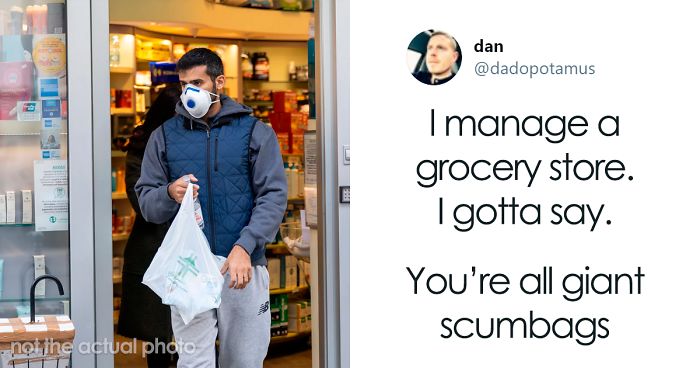
Angry Retail Managers Are Revealing How Coronavirus Is Bringing Out The Worst In Customers
As panic buyers flood Targets, Walmarts, and local businesses to stockpile on pretty much everything, many of them forget that those who refill the shelves are humans, too. Frustrated with recent shopping behavior, grocery store manager @dadopotamus turned to Twitter to share his emotions.
“I manage a grocery store. I gotta say. You’re all giant scumbags,” he wrote.
Other retail workers, as well as sensible buyers, immediately joined in to share their experiences. Pretty soon the thread went viral, sparking a discussion about how we all should behave during this crisis. While many aspects are still up for debate, one thing is certain, though. Far too many retail workers are treated like crap.
Image credits: Denis Sokol
Image credits: dadopotamus
Image credits: BzLindberg
Image credits: DunBiken
Image credits: TSannis
Image credits: OpheliasMarbles
Image credits: dadopotamus
However, not all buyers are changing their shopping habits yet. According to a recent survey, about 54 percent of millennials say the new coronavirus has significantly or somewhat impacted their purchase decisions, while the same applies to only 33% of baby boomers, 42% of Gen X, and 49% of Gen Z. The results also showed some differences between how men and women are responding to the crisis. For example, even though more women (71 percent) than men (60 percent) reported being “worried about the coronavirus,” nearly half of the men surveyed (47 percent) said it has impacted their purchase decisions, versus 41 percent of women. Furthermore, 38 percent of men agreed that it had also impacted where and how they shop compared to 33 percent of women.
Greg Petro is the CEO of First Insight, a company that gathers real-time consumer data through the use of online consumer engagement and applies predictive analytic models powered by machine learning and AI to create actionable insights. He told Bored Panda that, “In response to the coronavirus outbreak, men’s behavior is changing even more dramatically than females’, which may be instinctual, habitual or due to the fact that men and women use different areas of the brain for solving problems and accomplishing tasks.”
“It’s been documented that men and women shop differently even under normal conditions. Men are more likely to be on a hunting mission for a specific item, while women tend to browse more. This difference has likely contributed to the higher rate of behavior change among men. As the virus spreads, shopping behaviors of both men and women are likely to be impacted even more profoundly.”
According to Petro, even if consumers do not intentionally alter their spending behavior in the face of the outbreak, market and supply chain disruptions will force behavior changes. “For the first time in the history of modern retail, supply is constrained as retail supply chains have experienced significant disruption. This impact will likely be felt starting in April and May. Production may be unable to catch up to demand, which would affect summer, fall, and potentially holiday sales.” However, if retailers and brands act quickly, they can lock in their share of scarce supply and be able to offer products to consumers as planned to enable shopping to stay on track.
Image credits: TwoLs60
Image credits: COLOStormChaser
Image credits: dadopotamus
And while photos of empty store shelves on social media give the appearance that the United States is running out of food, the nation’s biggest retailers, dairy farmers, and meat producers say the reality is quite different. According to them, the food supply chain remains intact and has been ramping up to meet the growing demand.
“There is food being produced. There is food in warehouses,” Julie Anna Potts, chief executive of the North American Meat Institute told The New York Times. “There is plenty of food in the country.”
“Our stores are getting stocked every day,” Ron Vachris, chief operating officer of Costco, added. “Transportation is functioning, our suppliers are working around the clock and the flow of goods is strong.”
The National Chicken Council confirmed that it was not seeing any disruptions in production and noted that there were “ample surplus supplies of chicken in cold storage” — totaling more than 950 million pounds, according to official data.
Still, panic buyers are testing the food system’s capacity. Retailers say the panic buying started about 2 weeks ago when customers couldn’t get a hold of hand sanitizers and wipes which at the time were in short supply. And that is what set off the stockpiling frenzy seen in recent days, including bread, canned goods, milk, and frozen food.
“Meanwhile, retail outlets other than grocery stores are closing or reducing their operating hours, and consumers are reacting, with thirty percent of consumers overall reporting they’re shopping less in-store,” Petro added. “To minimize in-store shopping exposure, forty-seven percent of Gen Zers say they’re using curbside pickup services and thirty percent of Millennials report that they use BOPIS (buy online, pick up in-store) options. As the outbreak unfolds, one thing we can all do to help is to shop based on our actual needs and to assist at-risk people with their shopping. We can also help local independent retailers by purchasing gift cards directly from them to use for future purchases. This applies to local restaurants as well. They need the cash flow, and they need it now.”
According to the expert, one mistake buyers may be particularly tempted to make is to stock up even beyond what they and their families truly need, thereby decreasing others’ ability to secure even a baseline supply of essential products. “The recent run on toilet paper in the U.S. is an example of this. On the flip side, it is also unwise to hold off on purchases, thinking that prices may come down. With shrinking supply levels looming, availability is unlikely to improve in the short- to mid-term. If you see something you know you need or want, making the purchase now will avoid disappointment and frustration later.”
Image credits: ashleysweetlyx
Image credits: robynski
Image credits: Alean4
Image credits: TheGreatDanBaer
Image credits: Murdersmith
Image credits: SUZAN916
Image credits: DMoPrime
Image credits: plantz3610
Image credits: amkay2012
Image credits: chrystadawn
Image credits: jonmnelson
Image credits: JulzyaIsaidit
Image credits: TravelinTrilogy
Here’s what people said about the discussion
No, we are not all scumbags. I didn’t hoard any food or supplies. I keep shopping every week like I normally do. Some of us have common sense and decency. Regardless, I would never want to work in retail. Some people are real jerks.
Same, i went online and ordered 24 rolls of toilet paper, that will do me, we have plenty of food at the moment and me and my wife are healthy adults that don't need to hoard stuff and be selfish a******s.
Load More Replies...I'm happy that the stores around here are indeed putting limits on how many of an item that people can buy. Contrary to "Dan"'s assertion in one of the tweets above, there are "critical thinking" reasons for placing limits on sales: ensuring that others can buy necessary items, to avoid price-gouging resales, and to discourage selfish hoarding.
Same! There's a limit of 2 packets of loo roll per customer. Result: there's still loo roll on the shelves. 2 bottles of hand sanitiser too. There's none of that left right now but at least we don't get price-gougers.
Load More Replies...No, we are not all scumbags. I didn’t hoard any food or supplies. I keep shopping every week like I normally do. Some of us have common sense and decency. Regardless, I would never want to work in retail. Some people are real jerks.
Same, i went online and ordered 24 rolls of toilet paper, that will do me, we have plenty of food at the moment and me and my wife are healthy adults that don't need to hoard stuff and be selfish a******s.
Load More Replies...I'm happy that the stores around here are indeed putting limits on how many of an item that people can buy. Contrary to "Dan"'s assertion in one of the tweets above, there are "critical thinking" reasons for placing limits on sales: ensuring that others can buy necessary items, to avoid price-gouging resales, and to discourage selfish hoarding.
Same! There's a limit of 2 packets of loo roll per customer. Result: there's still loo roll on the shelves. 2 bottles of hand sanitiser too. There's none of that left right now but at least we don't get price-gougers.
Load More Replies...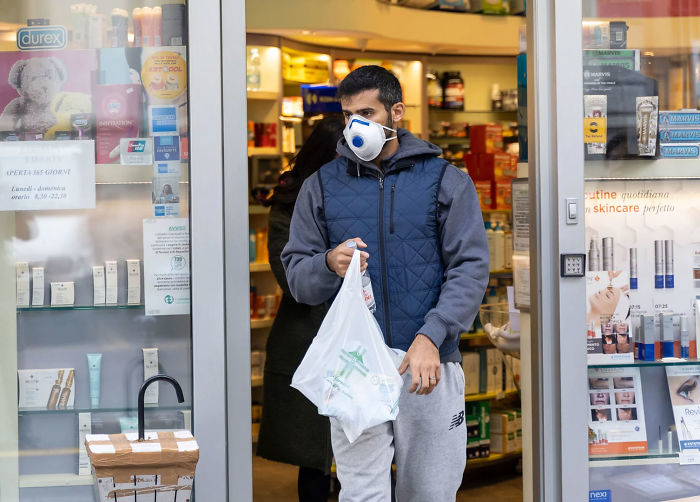
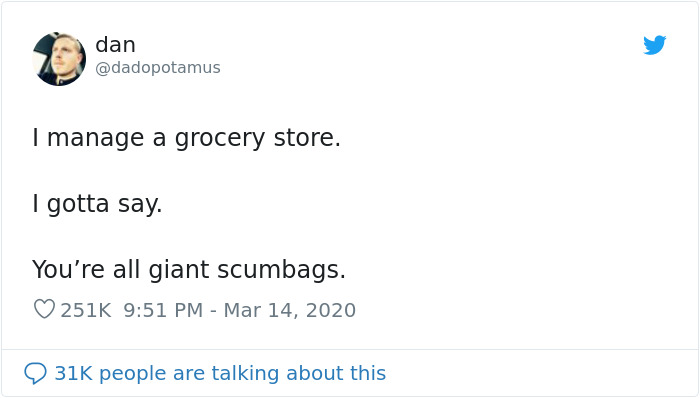
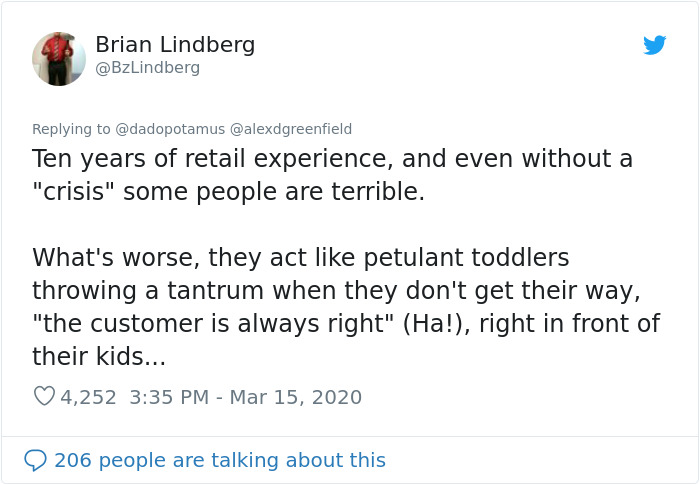
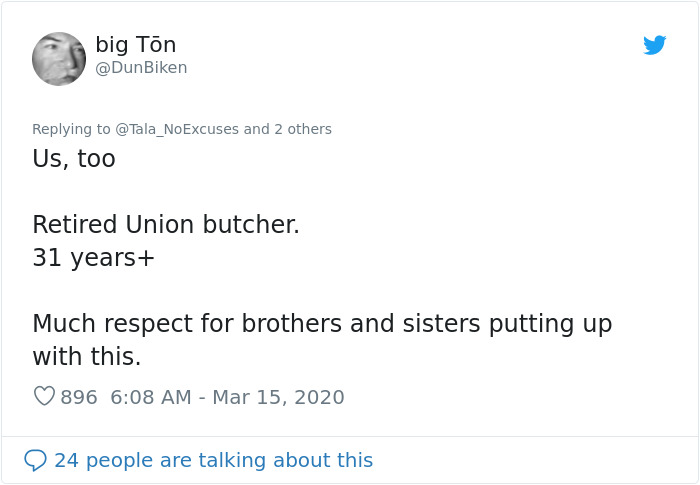
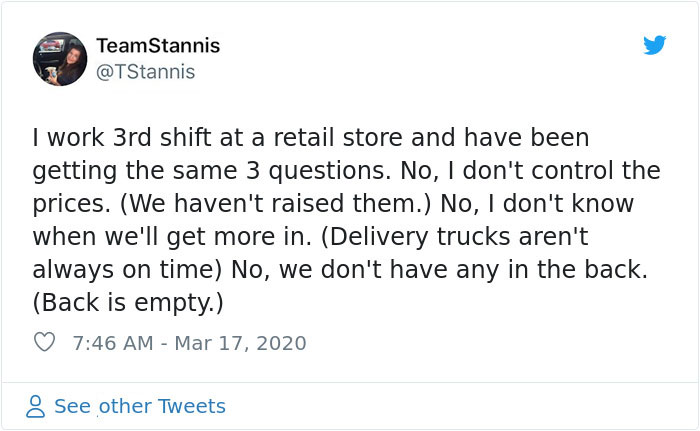
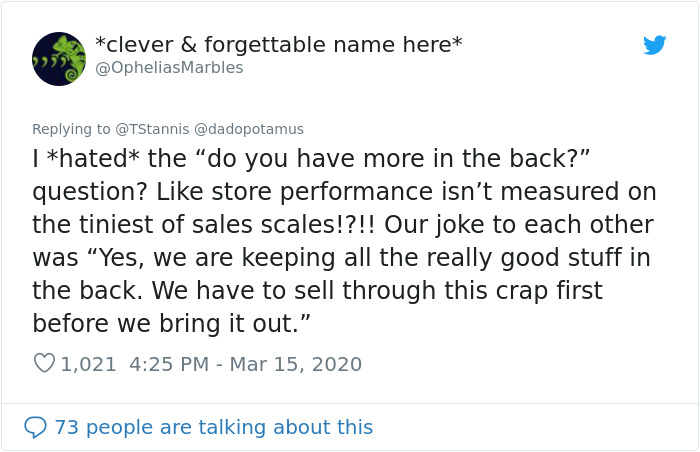
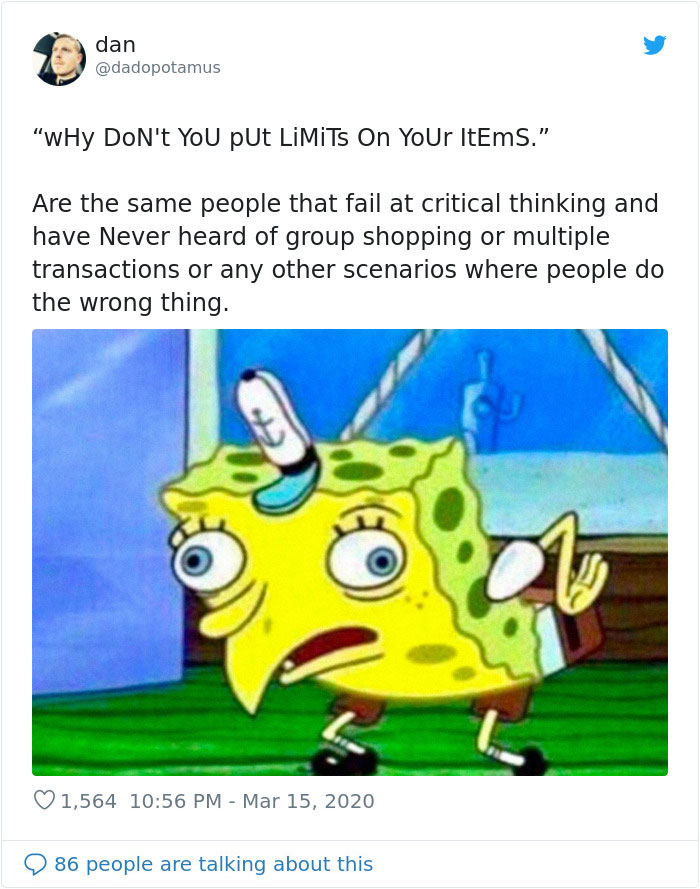
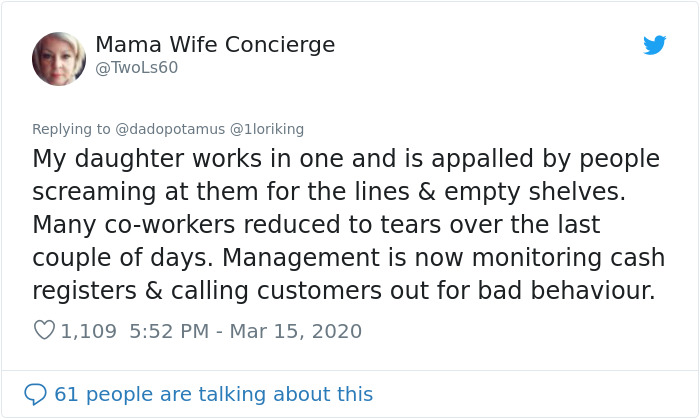
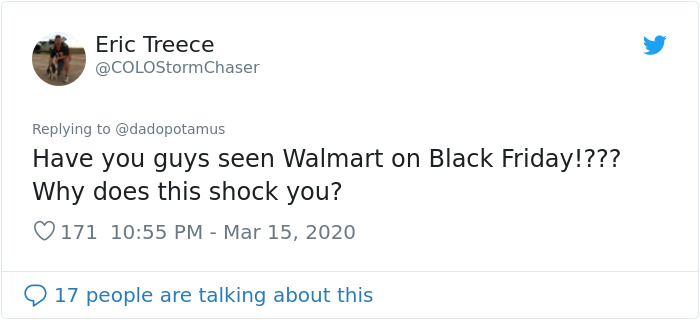
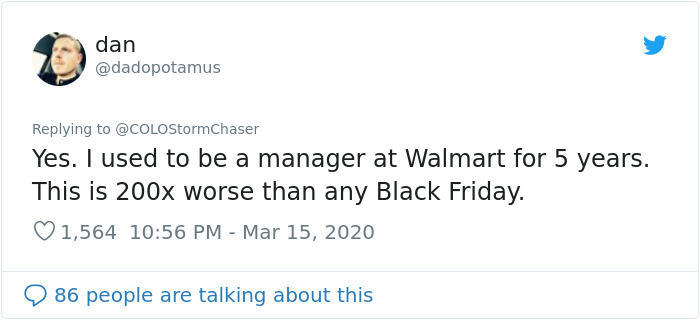
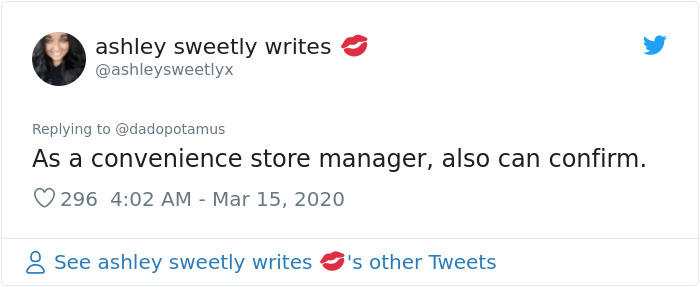
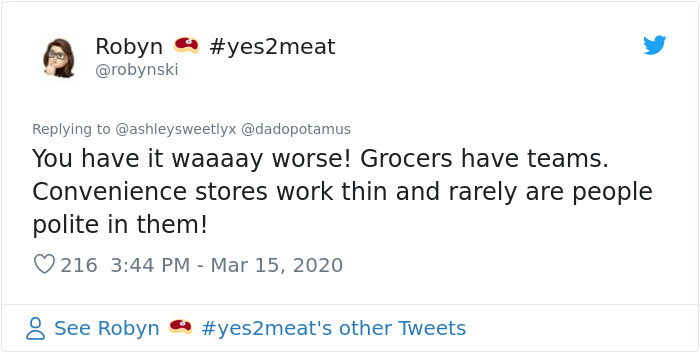
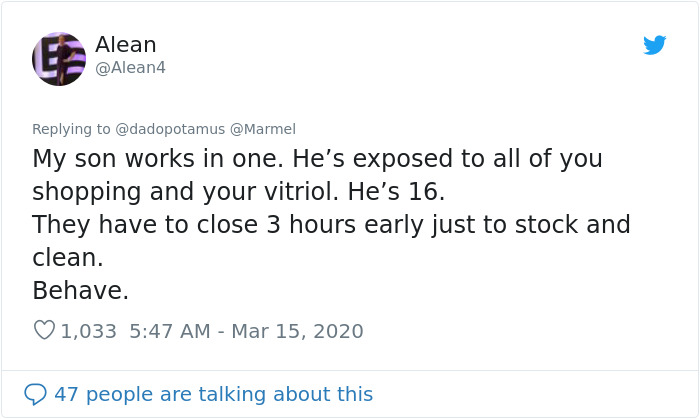
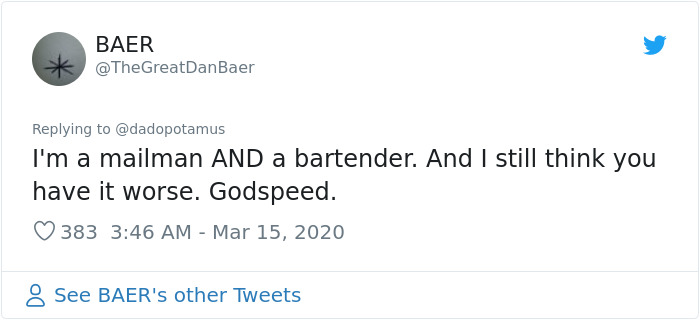
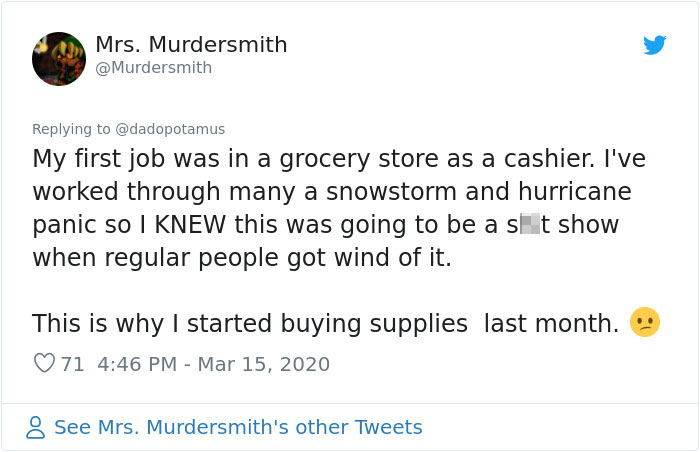
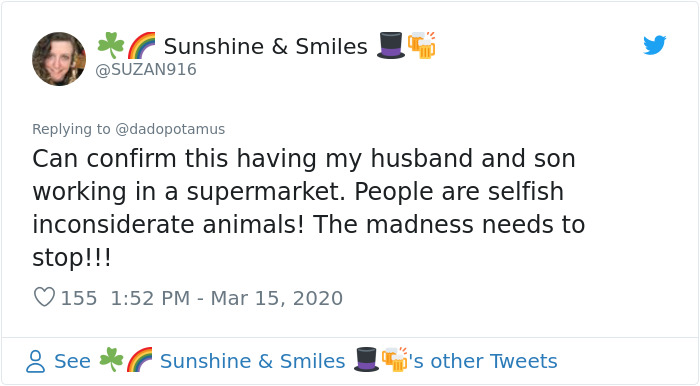
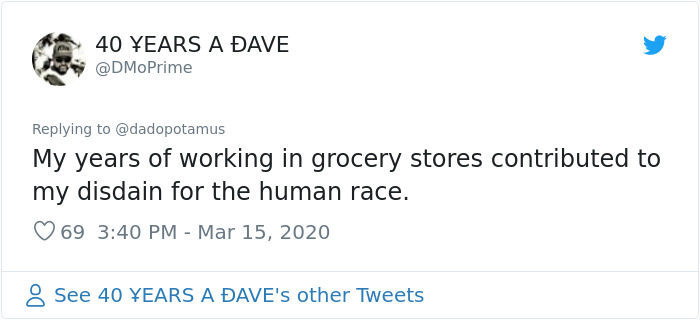
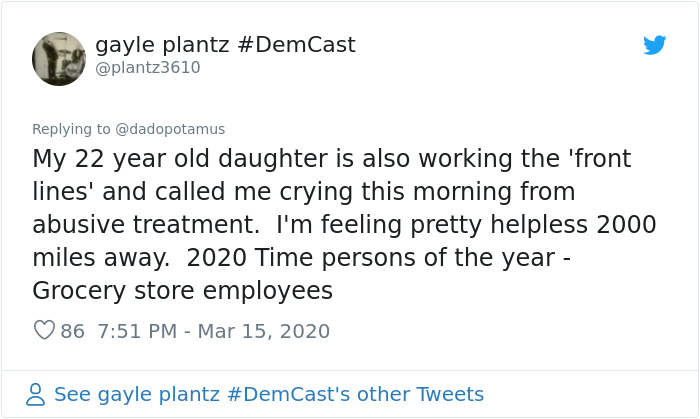
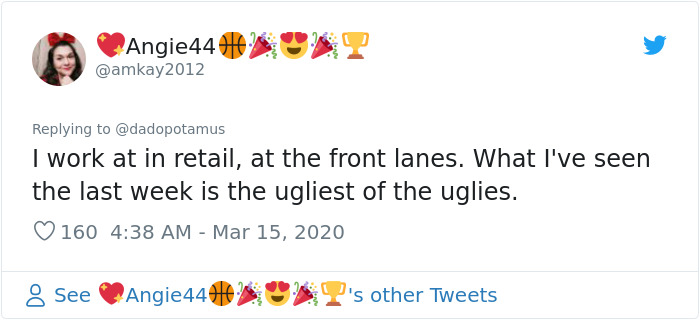
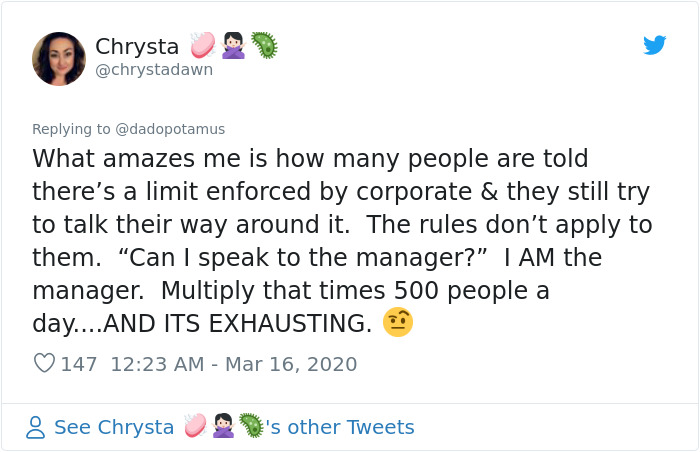
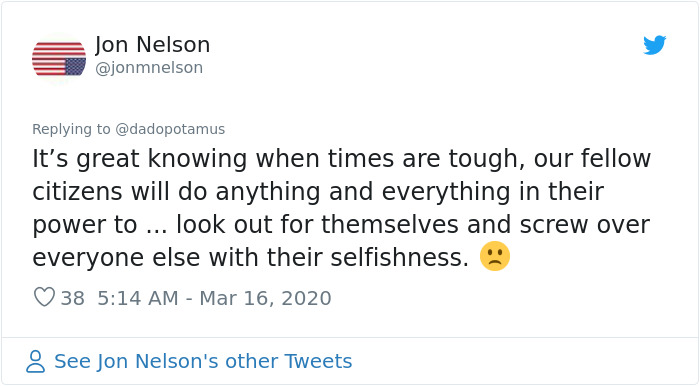
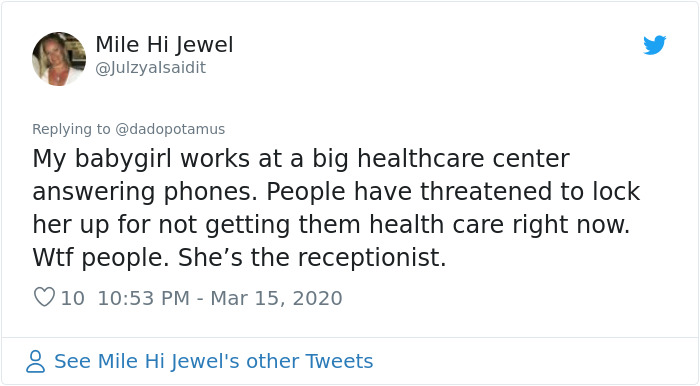

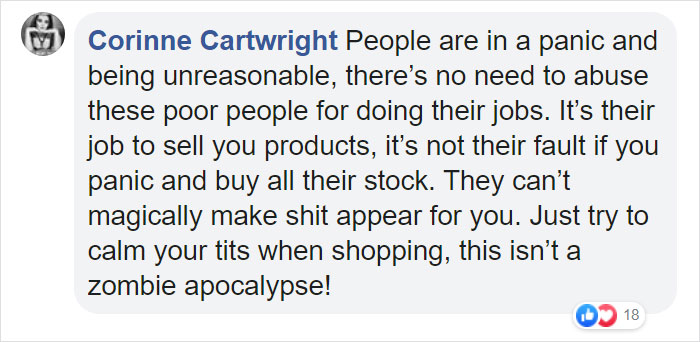
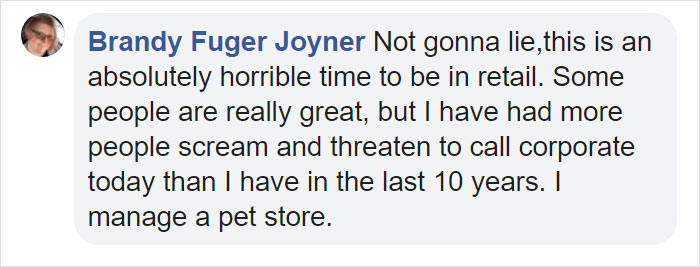
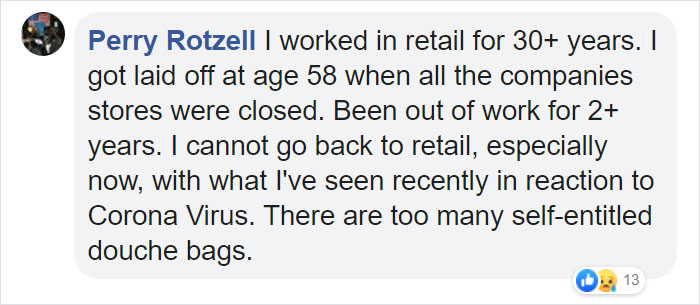
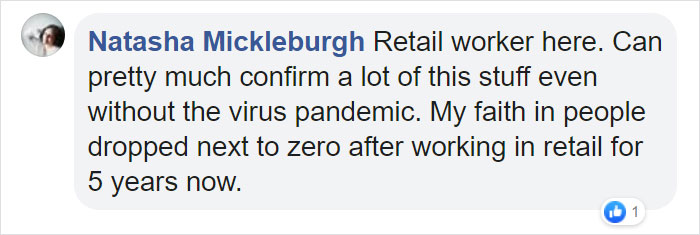
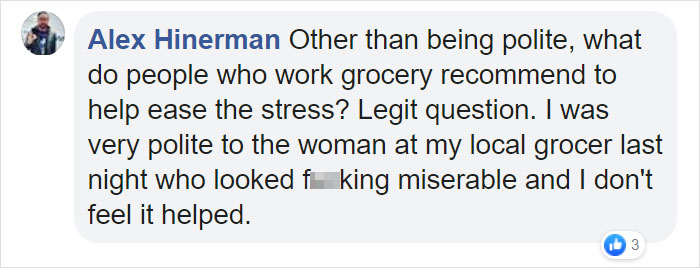
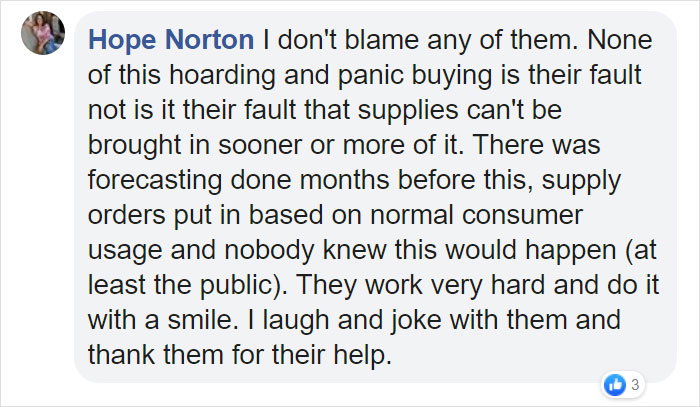





117
31